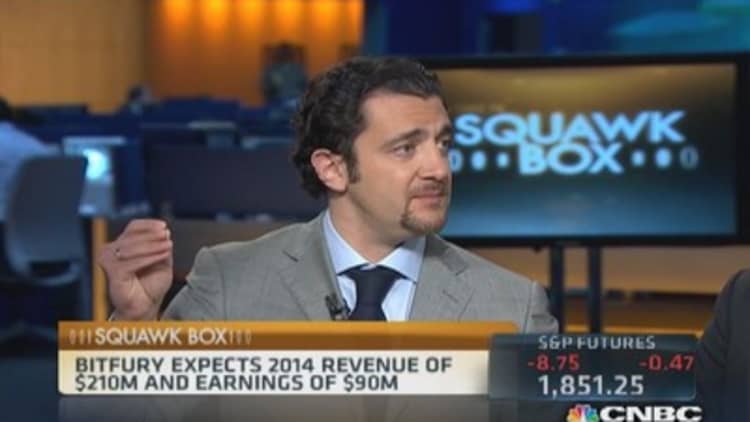
The rules governing bitcoin that limit the creation of the open-source virtual currency to 21 million units could one day be modified if a majority of its users were in agreement, said a top executive at one of the world's largest bitcoin "mining" companies.
George Kikvadze, board member and advisor of BitFury, said Monday that if the notion of a finite number of bitcoins was ever altered it would be fair and should not undermine the value. During an interview Monday on CNBC's "Squawk Box," he likened it to when "governments go in and print money." About 12.6 million bitcoins are in circulation now.
Read MoreCNBC explains bitcoin
Addressing concern in the bitcoin community about government regulation, he said he actually welcomes it as means of giving people confidence in the peer-to-peer payment system. "We need the regulation to get to that stage. Look at the Internet in '93 and '94, [bitcoin] is in the early stage of adoption," he said. "Regulation is good."
Last month, the Internal Revenue Service said it will treat bitcoins—and similar virtual currencies—as property, not currency for federal tax purposes. Meanwhile, Benjamin Lawsky, superintendent of New York's Department of Financial Services, said he intends to provide regulations later this year, that could make New York the first U.S. state to regulate virtual currencies. "We want to be at the negotiating table" as these new regulations and rules are developed, Kikvadze said.
Read MoreIRS says bitcoin is property rather than currency
BitFury makes proprietary chips to enable the "mining" of bitcoin. "You can use this chip for bitcoin-like coins as well," said founder Val Vavilovs.
Anyone can "mine" for bitcoins with the right software and hardware. Advocacy group bitcoin.org—operated by core developers of the so-called cryptocurrency—describes the process on its website.
"New bitcoins are generated by a competitive and decentralized process called 'mining'. This process involves that individuals are rewarded by the network for their services. Bitcoin miners are processing transactions and securing the network using specialized hardware and are collecting new bitcoins in exchange."
"Mining" is a slow process and the protocol calls for bitcoin to be created at a predictable and decreasing rate—automatically halving over time until issuance halts with a total of 21 million bitcoins in existence. "It's probably going to be in the next 15 to 20 years," Kikvadze explained.
Created in 2009, bitcoin has no single overseer like a central bank.
In fact, Kikvadze pointed out that even Nobel Prize-winning economist Milton Friedman had favored abolishing the Federal Reserve and going to a machine program that would keep the quantity of money going up at a steady rate.
Read More
—By CNBC's Matthew J. Belvedere.


